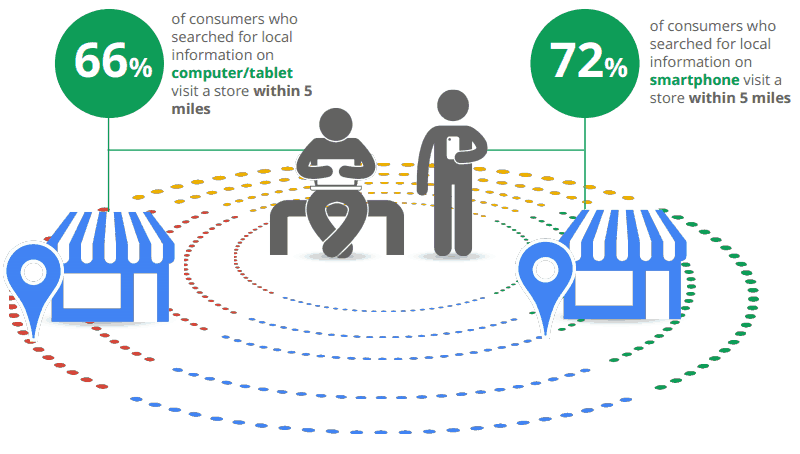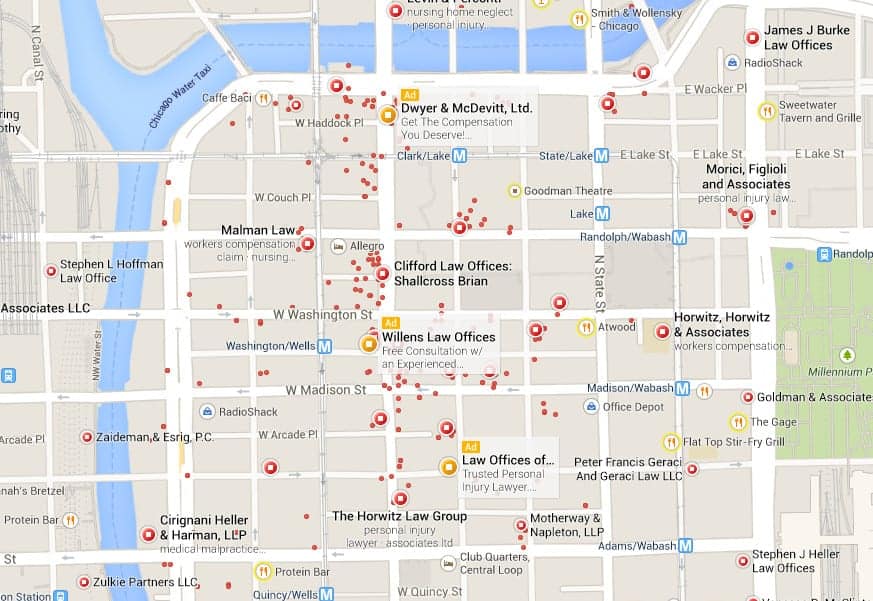
You don't need to be a search scientist to know that people search for local businesses online. In fact, you probably know this from personal experience.
In an effort to better understand consumer local search behavior, Google recently conducted, and published the results from, its Understanding Consumers' Local Search Behavior study.
The study focused on the behavior of 18+ year-olds who typically perform smartphone searches a few times per week. It focused on these partipants' behavior in 9 verticals:
Here's what they concluded:
Consumers search with their location and proximity in mind
- 4 in 5 consumers use search engines to find local information.
- They search on smartphone and computer/tablet for: store address, business hours, product availability and directions
Local searchers take action
- 50% of consumers who conducted a local search on their smartphone visited a store within a day, and 34% who searched on computer/tablet did the same.
- Local searches lead to more purchases than non-local searches. 18% of local searches on smartphone lead to a purchase within a day vs. 7% of non-local searches.
Consumers prefer and act on location-based ads
- 4 in 5 consumers want ads customized to their city, zip code or immediate surroundings.
- More than 60% of consumers have used location information in ads. They say it’s important to have store address and phone number in ads on computer/tablet, and directions and the call button in ads on smartphone.
Many of you will likely quickly distinguish between the behavior of consumers looking for restaurants and those looking for law firms. And there is no doubt that there are many significant differences in the way that your potential clients look for lawyers like you and the way that they look for a place to eat. But there are some things that lawyers would be smart to consider from this study.
First, let's dispel with those "search is dying" myths. People still greatly favor search engines to find local information. Further, more and more of them are searching on mobile devices.
If you haven't updated your site to a responsive design that is easy to use on a smartphone, you are turning potential clients away. It's really that simple.
Second, the study sheds some useful insight into the types of things that local searchers want to know about local businesses. This information includes:
Law firms that seek to earn attention from local searchers need to think seriously about what the people who are searching for them want. In addition to basic contact and location information, they're likely to want to see:
Lawyers who make it difficult for people to learn about and contact them will miss out on new client opportunities.
Finally, proximity matters to local searchers.

This is something that is less intuitive for many lawyers, especially personal injury lawyers.
If you have a statewide practice, you probably don't think much of proximity. If they're a "good client" you'll be willing to travel great distances for them.
But for many local searchers, distance matters.
So, your efforts to appeal to local searchers who are searching in a location that's very far from your office will be largely futile.
We run into this all the time.
Lawyers who have offices outside of major cities demand local search visibility in the city.
Sometimes, search engines will show businesses across a large geographic region in their local search results. Most of the time, it's a very specific area. This is especially true for major metro areas.

But even if you are able to achieve visibility beyond 5 miles, in many cases, it will be perceived as too far by your potential clients. Of course, you'll never know because they'll never contact you.
That's not say that it's impossible to earn meaningful attention and inquiries outside of a five mile radius. It's just that you're going to be less likely to earn that attention from searchers who are performing very localized searches.
This is why part of your SEO strategy should include targeting potential clients who are performing long-tail research and informational queries. You will be less likely to have to overcome this proximity bias.

Over the years, law firm prospects have sent us reports from just about all of our competitors. Unfortunately, even today, some law firm marketing agencies still mislead their clients via "reporting." One particularly egregious example comes in the form of ranking reports. Which prompted this LinkedIn post. To my surprise, I received a lot of […]
John Wanamaker supposedly said "Half the money I spend on advertising is wasted; the trouble is I don't know which half." In an an effort to figure out "what half is working," attribution was born. Coupled with a transition from traditional, offline ads to digital media, attribution became the holy grail for analyzing advertising spends. But […]
I recently asked ChatGPT, "What are some of the top personal injury law firms in Chicago?? Actually, first I ask "who are some of the top personal injury lawyers in Chicago?" ChatGPT couldn't handle that one, so I modified the prompt. ChatGPT listed five very well-known firms downtown. Can you guess the other four? That's […]
If you're like me, you have some degree of AI, ChatGBT, Bard, exhaustion. Now don't get me wrong, this is stuff is remarkable and is changing, well, a lot. But before you hook up the ChatGPT API to your WordPress API and crank out 10,000 pages, here are a few things to think about. Let's […]
If you know me, you know my opinions about links and SEO advice from Google. If you don't, here's the TL;DR: Meh, links! Meaning, all things being equal, links still remain a competitive difference maker for ranking. Take Google's SEO advice with several grains of salt. Google has no economic incentive to help your site […]
The best marketing advice I can give you is to be authentic. Of course, you don't find that very helpful in terms of meeting your growth goals. So, you might decide to game the system. As I'm writing this, one of the more popular ways to gain the system is to pay for engagement. This […]
The following post was written by ChatGPT. ChatGPT, developed by OpenAI, is a state-of-the-art language model that can generate human-like text based on a given prompt or context. This technology has the potential to revolutionize the way that businesses, including law firms, market themselves to potential clients. One way that a law firm could use […]
How long does SEO take? When can I expect to see results? What results should I expect to see? These are all reasonable questions that we field from lawyers every day. And, like many legal answers, the answer is: It depends. Yes, I know that's not the answer you wanted. But it's the most honest […]
And how much time should they spend doing it? I recently had the privilege of chatting with Tyson, Jim, and Conrad for an upcoming episode of The Maximum Lawyer Podcast. If you're not familiar with The Maximum Lawyer community, you should definitely check it out. Jim asked a really great question about who should do […]
Good points. We do reasonably well with the long tail informational queries for statewide clients, but owning the local 5 mile radius visibility range makes total sense, and it is something we should work on.
Exactly. Start targeting those Braintree, MA searchers! Lock down those local search ranking factors: http://moz.com/local-search-ranking-factors